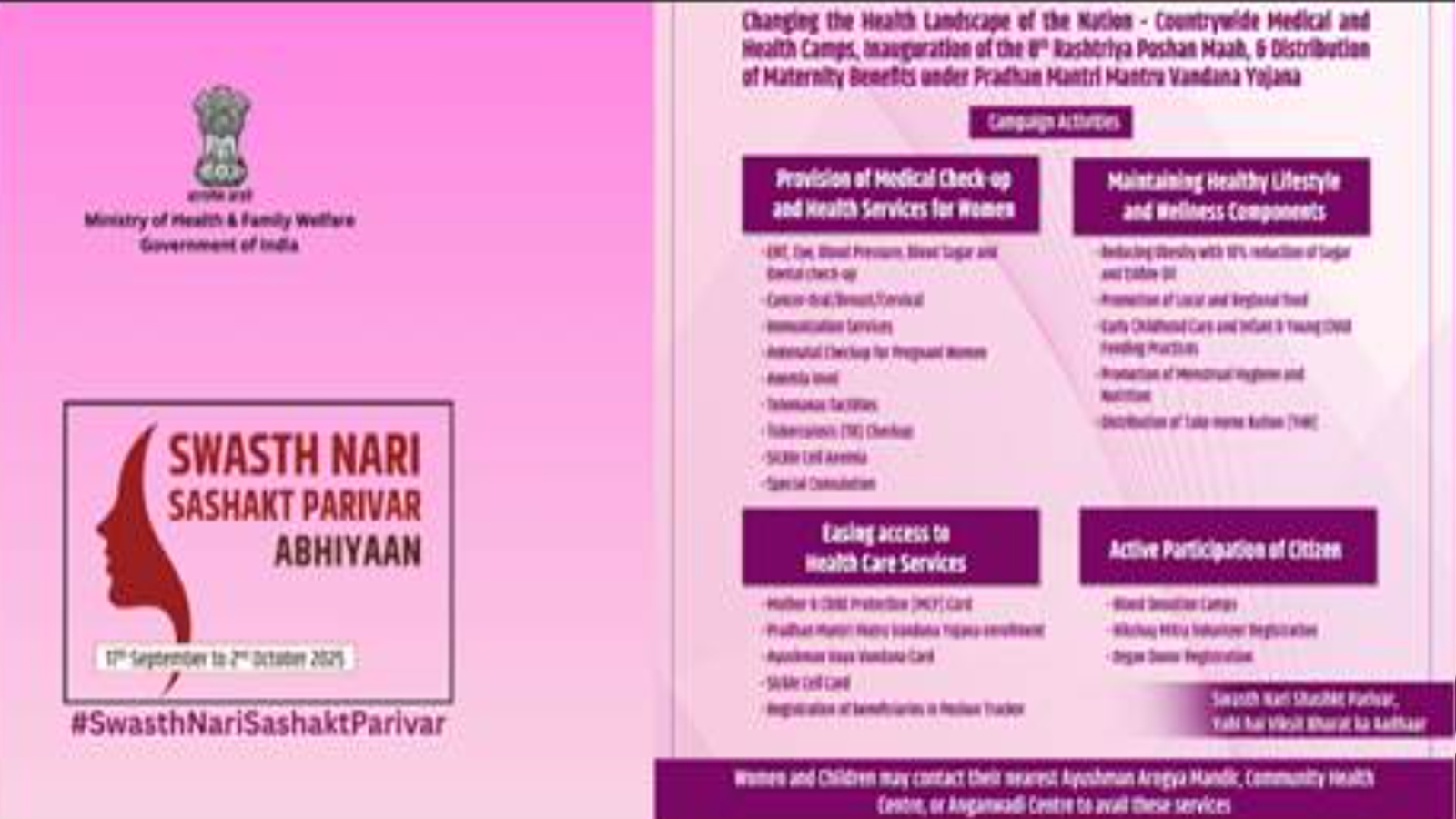The Centre is set to launch Swasth Nari, Sashakt Parivar Abhiyaan (SNSPA) on September 17, aligning with the 8th Poshan Maah, as part of its push to strengthen preventive, promotive, and curative services for women, adolescent girls, and children. The campaign is being jointly led by the Ministry of Health & Family Welfare (MoHFW) and the Ministry of Women & Child Development (MoWCD), with support from the Ministry of Ayush, among others. It aims to deploy over one lakh health camps across Ayushman Arogya Mandirs, Community Health Centres, District Hospitals, and other government health facilities nationwide, making it the largest health outreach for women and children in India.
SNSPA builds on existing health, nutrition, and community welfare programs and addresses gaps exposed in national health surveys. The campaign runs until Gandhi Jayanti (October 2, 2025) and is conceived as a Jan Bhagidaari Abhiyaan, which means it seeks active participation from private hospitals, healthcare professionals, self-help groups, Anganwadis, and local community functionaries. Activities will include comprehensive screening for anemia, hypertension, diabetes, cancer, tuberculosis, and sickle cell disease, with special attention to maternal, adolescent, and child health, immunization, nutrition, menstrual hygiene, and lifestyle counselling.
One of the key features of SNSPA is real-time monitoring through Systematic Assessment of Health care providers Knowledge and Training (SASHAKT) portal, which will allow tracking of the health camps’ progress, attendance, screening outcomes, and outcome referrals. Community support systems will play a central role, particularly Nikshay Mitras, who are expected to assist in TB care, counselling, and nutrition support. Specialist services in gynecology, pediatrics, dermatology, ENT, psychiatry, eye, and dental care will also be mobilized across government and private hospitals to ensure follow-up where needed.
The involvement of the Ministry of Ayush adds a holistic dimension: kiosks for lifestyle counselling, yoga sessions, awareness of herbal and traditional medicines, and “Prakriti Pareekshan” are planned. The campaign also intends to run social media, radio, and television campaigns; distribute home remedies/nutrition kits; and use educational platforms to reach women, especially in rural and tribal areas.
Expected benefits include early detection of diseases, which often go unnoticed in women, leading to better health outcomes, reduced mortality, less burden on health systems, and more equitable access across urban, rural, and tribal regions. Nutrition, menstrual hygiene, and preventive care interventions are likely to improve maternal and child health indicators. The outreach is also meant to strengthen the linkages of existing health schemes like Pradhan Mantri Jan Arogya Yojana (PM-JAY), Ayushman Bharat Health Account (ABHA), Ayushman Vaya Vandana, etc., so that beneficiaries are not just screened but also covered under entitlements and follow-ups.
Challenges lie ahead: ensuring infrastructure and personnel are in place for camps in remote or underserved locations; ensuring supply chains for diagnostic tools, medications, and tracing/referral pathways work; motivating participation, especially among women in conservative or remote communities; ensuring that real-time monitoring translates into action where gaps are found; and ensuring outreach does not end with the campaign but continues regularly.
If implemented well, SNSPA could shift India’s health system closer towards preventive and community-based care for women and families, rather than episodic or reactive care. It can help reduce avoidable suffering, improve quality of life, and help put women’s health more centrally in national development.














